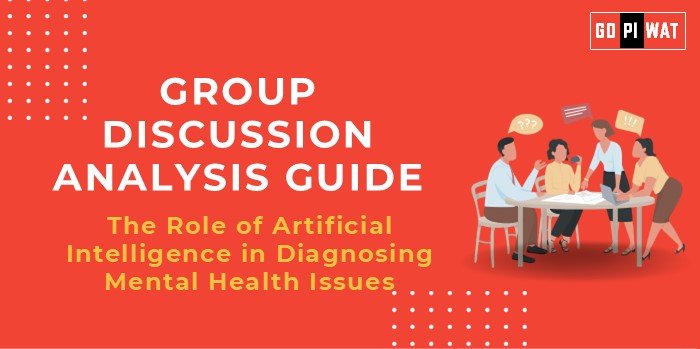📋 Group Discussion Analysis Guide: The Role of Artificial Intelligence in Diagnosing Mental Health Issues
🌟 Introduction to the Topic
- Context Setting: Artificial Intelligence (AI) is revolutionizing healthcare, offering innovative ways to address the global mental health crisis. With mental health disorders affecting over 1 billion people worldwide, AI’s potential to enhance early detection, diagnosis, and treatment is pivotal for B-school students exploring intersections of technology and social impact.
- Topic Background: Mental health diagnostics have traditionally relied on subjective assessments. AI provides data-driven insights using advanced tools like machine learning algorithms, natural language processing, and wearable devices. This paradigm shift has opened new avenues for improving mental healthcare accessibility and efficiency.
📊 Quick Facts and Key Statistics
- 🌍 Global Mental Health Crisis: 1 in 8 people worldwide suffer from mental health conditions (WHO, 2023).
- 📈 AI Market in Mental Health: Expected to grow at a CAGR of 36% to reach $10 billion by 2027 (Market Research Report, 2023).
- ✅ Diagnosis Accuracy: AI tools achieve up to 85% accuracy in detecting depression and anxiety through speech and text analysis (Journal of Psychiatry, 2023).
- 💻 AI Applications: 40+ digital therapeutics approved globally for mental health support.
- ⚠️ Access Gap: Over 75% of individuals in low-income countries lack access to mental healthcare (WHO).
🔗 Stakeholders and Their Roles
- 🏥 Healthcare Providers: Integration of AI to complement traditional diagnostic tools.
- 💻 Tech Companies: Developing AI-driven platforms for mental health monitoring.
- 🏛️ Governments: Funding research and setting regulations for ethical AI use.
- 👥 Patients and Advocates: Advocating for personalized and stigma-free AI-based interventions.
🏆 Achievements and Challenges
✨ Achievements:
- ✅ Enhanced Accessibility: AI-powered chatbots like Wysa and Woebot offer 24/7 support.
- 📊 Predictive Analytics: Algorithms can predict relapse risk in patients, improving treatment outcomes.
- 💰 Cost-Effective Solutions: AI reduces the cost of mental health diagnostics and therapy by 30% (McKinsey, 2023).
- 🇬🇧 Global Examples: The UK’s NHS uses AI for suicide risk assessment with a 60% reduction in manual screening efforts.
⚠️ Challenges:
- 🔒 Data Privacy Concerns: Risks of misuse of sensitive mental health data.
- ⚖️ Bias in Algorithms: AI models may reflect racial or cultural biases.
- 📜 Lack of Regulation: Inconsistent global frameworks for ethical AI implementation.
💡 Structured Arguments for Discussion
- Supporting Stance: “AI democratizes mental healthcare, making diagnosis and support accessible to underserved populations.”
- Opposing Stance: “Overreliance on AI can depersonalize mental health care and compromise patient outcomes.”
- Balanced Perspective: “While AI offers transformative potential, it must complement—not replace—human intervention in mental health care.”
🎯 Effective Discussion Approaches
- Opening Approaches:
- 📊 “With 1 in 8 people globally affected by mental health conditions, AI-driven solutions provide scalable diagnostic tools for underserved regions.”
- 🔍 “While AI promises 85% diagnostic accuracy, ethical challenges in data use remain a significant concern.”
- Counter-Argument Handling:
- 📉 Recognize limitations in current AI tools.
- ✅ Propose safeguards like bias mitigation and robust data protection laws.
📈 Strategic Analysis of Strengths and Weaknesses
- 💪 Strengths: Scalability, data-driven insights, cost reduction.
- 🛑 Weaknesses: Ethical dilemmas, reliance on quality data, algorithm bias.
- 🌟 Opportunities: Partnerships with NGOs, expansion into rural areas.
- ⚡ Threats: Mistrust in AI, potential misuse of technology.
🎓 Connecting with B-School Applications
- 📌 Real-World Applications: Incorporate AI in mental health projects addressing healthcare inequities.
- 🧐 Sample Interview Questions:
- 💬 “How can AI bridge the mental health treatment gap in developing countries?”
- 📱 “Evaluate the ethical considerations of AI in mental health care.”
- 💡 Insights for Students: Explore the business of digital therapeutics and AI-driven healthcare analytics.


